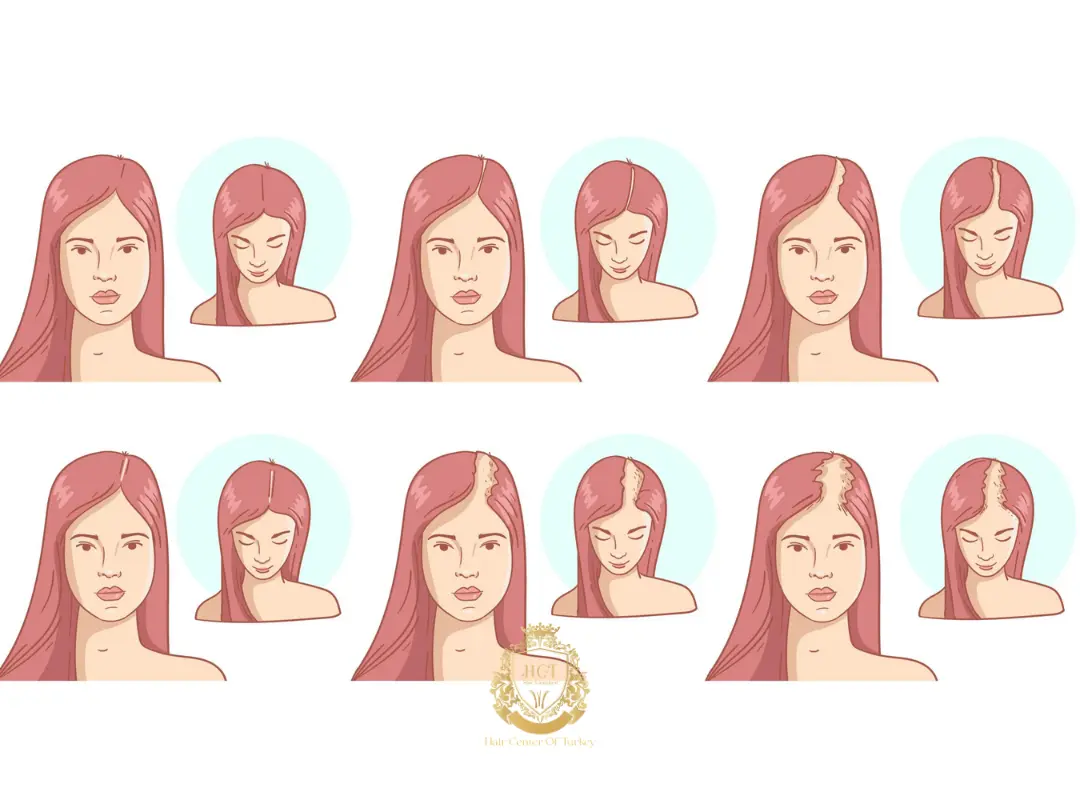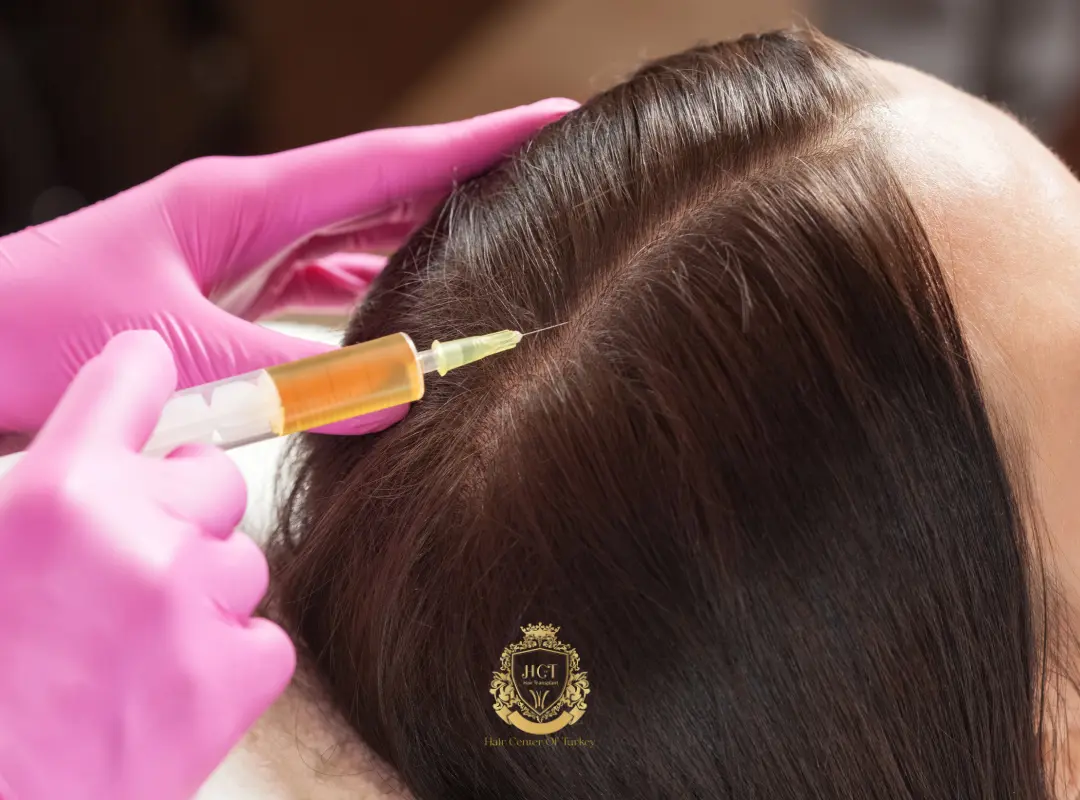Hair Loss in Women
Losing 50 to 100 strands of hair per day is considered normal for women, but persistent or increasing hair loss may indicate an underlying issue. Hair loss in women is usually diffuse, not isolated to specific areas, and can be influenced by genetic, hormonal, nutritional factors, stress, and medical conditions.

Table of Contents
Is Hair Loss Normal in Women?
Hair naturally grows and sheds in cycles. With about 100,000 strands on the scalp, daily shedding within a normal range is part of a healthy renewal process.
Hair loss becomes concerning when the volume noticeably increases, lasts more than two months, or is accompanied by thinning, widening of the part line, or reduced ponytail thickness. In such cases, a medical evaluation is recommended.
Types of Hair Loss in Women
Hair loss in women generally falls into three main categories.
Anagen Effluvium
This type occurs when hair growth is interrupted during the active growth phase. It is most commonly associated with treatments like chemotherapy or serious medical conditions that directly damage hair follicles.
Telogen Effluvium
Telogen effluvium is a temporary condition caused by disruption of the hair cycle. A large number of strands simultaneously enter the resting phase, resulting in diffuse shedding weeks or months after triggers such as stress, illness, childbirth, or rapid weight loss.
Androgenetic Alopecia (Female Pattern Hair Loss)
This is the most common form of hair loss in women. It has a genetic influence and typically appears later than male pattern baldness.
Hair thinning mainly occurs in the crown area, with widening of the central part, while the frontal hairline usually remains intact. Complete baldness is rare.
How Common is Hair Loss in Women?
Hair loss affects more than half of all women at some point in life. Female pattern alopecia alone affects approximately one in three women, especially with age.
Despite common belief, hair loss is not exclusive to men and represents a significant concern for women’s health and quality of life.
Common Symptoms of Hair Loss in Women
Signs that hair loss may be occurring include:
Increased shedding on the pillow, in the shower, or when brushing
Visible thinning or widening of the part line
Reduced hair volume, such as a thinner ponytail
Greater visibility of the scalp in the crown area
These changes typically develop gradually and may go unnoticed in early stages.
How Hair Loss is Diagnosed
Diagnosis begins with a clinical evaluation and medical history. The healthcare provider may perform or recommend:
Gentle hair pull test
Blood tests to assess iron, vitamin levels, and thyroid function
Scalp trichoscopy exam
Scalp biopsy in selected cases
Identifying the cause is essential for choosing the appropriate treatment approach.

Who is More Prone to Hair Loss?
Hair loss can affect any woman, but the risk is higher among:
Women over 40
Postpartum women
Menopausal women
People under chronic stress
Women who use very tight hairstyles or harsh chemical treatments
Individuals with nutritional deficiencies or hormonal disorders
Common Causes of Hair Loss in Women
Genetic Factors
Family history plays an important role, especially in female pattern alopecia.
Hormonal Changes
Pregnancy, menopause, thyroid disorders, and hormonal medications can interfere with the hair cycle.
Nutritional Deficiencies
Low levels of iron, vitamin B12, vitamin D, folic acid, or essential fatty acids can weaken hair growth.
Stress and Rapid Weight Loss
Psychological stress and restrictive diets can trigger telogen effluvium.
Medical Conditions and Medications
Chronic diseases and certain medications, including chemotherapy and hormonal therapies, can cause hair loss.
Scalp and Skin Conditions
Dermatitis, psoriasis, lupus, and other inflammatory conditions can affect follicles and lead to hair loss.
Mechanical and Traction Factors
Tight hairstyles, inner caps, and repeated tension on the scalp can cause traction alopecia over time.
Common Misconceptions About Hair Loss
Several popular beliefs about hair loss are incorrect:
Washing hair frequently causes hair loss – False
Dandruff causes permanent hair loss – False
Stress always causes permanent hair loss – False
Shaving makes hair grow back thicker – False
Hats or wigs cause hair loss – False
Understanding the facts helps avoid unnecessary anxiety.

Treatment Options for Hair Loss in Women
Treatment depends on the underlying cause and the health of the hair follicles.
Medical Treatments
Prescription treatments may be recommended in specific cases, always under medical supervision.
Nutritional Support
Correcting deficiencies through diet or supplements contributes to hair health when nutritional gaps are present.
PRP and Mesotherapy
These complementary treatments aim to improve the scalp environment and strengthen existing strands.
Hair Transplant
Hair transplant may be considered for selected women with stable donor areas and proper diagnosis. It is a surgical option and must be carefully evaluated.
When to See a Doctor
A professional evaluation is recommended if hair loss:
Lasts more than two months
Progresses rapidly
Causes visible thinning or bald patches
Is associated with other symptoms like fatigue or hormonal changes
Early diagnosis improves outcomes.
Frequently Asked Questions
Why am I losing so much hair as a woman?
Common causes include telogen effluvium, iron deficiency, thyroid issues, PCOS, and female-pattern loss.
What deficiency causes hair loss in women?
Iron deficiency is most common; low vitamin D, B12, zinc, or protein can contribute.
How can I stop hair loss in females?
Stop it by identifying the cause, correcting deficiencies, and considering topical minoxidil.
What vitamins help with hair thinning?
Vitamins help mainly if deficient: vitamin D, B12, iron, and zinc.
Can female hair loss grow back?
Yes, regrowth is common with telogen effluvium or deficiencies once treated.
Should I cut my hair if it’s thinning female?
A cut won’t stop loss, but shorter styles can improve the appearance of fullness.




